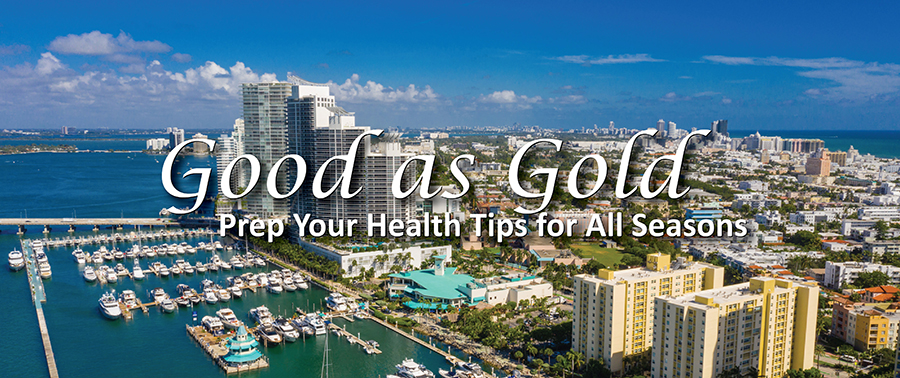Good as Gold Prep Your Health Tips for All Seasons
Posted on by
Some things just age well: jeans, wine, flannel sheets, and The Golden Girls.
That’s right, a 1980s sitcom about four single, women living, loving, and laughing together in Miami. It lasted just 180 episodes.
Since going off the air in 1992, however, the show has regained some of its luster. So much so, that last July 30 the Twittersphere was gifted #GoldenGirlsDay, a day to binge on the show (if available), eat cheesecake, and—in the case of this blog post—mine our fond remembrances of the show for pearls of personal health preparedness wisdom.
In observance of this year’s #GoldenGirlsDay, here are three Prepare Your Health lessons inspired by our favorite roommates.
Be a Friend
The lyrics to—or at least the sentiment of—the show’s infectious theme song said it best. Friends and neighbors are the kind of emergency supplies you can never have too many of.
People who are themselves prepared and invest in building relationships—both in person and on social networks—before an emergency can be in a better position to help others. Here are some ways you can be a good friend and neighbor before disaster strikes.
- Get to know your neighbors; especially, those who are elderly, live alone, depend on a home use medical device, and/or may need help in an evacuation.
- Stay up to date on your vaccines to help protect yourself from illnesses, such as seasonal flu. Getting vaccinated yourself may also protect people around you, including those who are more vulnerable to serious flu illness, like babies and young children, older people, and people with certain chronic health conditions.
- Talk about personal health preparedness with others. Fifty-three percent of people receive preparedness information through conversations with neighbors, friends, or family.
The “Vapors”
In season 7, a fictional hurricane named Gil made landfall in South Florida. We don’t know if the women were prepared with a generator, but let’s—for the sake of argument—pretend they did. The witty repartee writes itself:
BLANCHE:
Blanche theatrically presses the back of hand to her forehead and closes her eyes.
Goodness me, I feel faint. Sophia, look at my face. I do declare this must be what the vapors feels like.
Blanche is interrupted by the piercing beep of a carbon monoxide detector.
SOPHIA:
That’s not it, you airhead. You’re running a portable generator on the lanai and too close to the house. I swear, if your head was any lighter, it would be a balloon.
Unintentional, non-fire related carbon monoxide (CO) poisoning takes the lives of at least 430 people and sends another 50,000 people to the emergency department in the U.S. every year.
Here’s how you can prepare for and prevent CO poisoning after a disaster.
- Install battery-powered or battery backed-up CO detectors in your home. The U.S. Fire Administration recommends that you test your devices at least once a month. Change the batteries in your CO detectors every six months.
- Learn how to use a back-up generator safely. Place generators outside, in a dry area, and at least 20 feet from any door, window, or vent.
- Know the symptoms of CO poisoning. They are often described as “flu-like” without the fever—headache, dizziness, weakness, upset stomach, chest pain, and confusion. Breathing in too much CO can cause a person to pass out or worse—kill you.
Cheesecake
Aside from being #GoldenGirlsDay, July 30 is also National Cheesecake Day. Not a surprise, really. By one person’s estimate, the women ate over 100 cheesecakes in seven seasons. In most cases, eating cheesecake was communal. Together they talked out many of life’s problems and daily dilemmas over a slice.
What if cheesecake was the problem? Its three main ingredients—cream cheese, sour cream, and eggs—are on Foodsafety.gov’s list of perishable foods that you should throw away after four hours without power. Here are some more food safety tips to remember the next time your experience a power outage:
- Keep appliance thermometers in the refrigerator and freezer at all times. To keep food safe, the refrigerator should be at 40°F or below. The freezer should be at 0°F or below. When the power is out, the appliance thermometers will indicate the temperatures of the refrigerator and freezer.
- Discard refrigerated perishable food, including leftovers and meat, poultry, fish or seafood, that have been held above 40°F for more than two hours.
- Do NOT taste food to determine if it is safe to eat. When in doubt, throw it out.
For more information, recommendations, and tips on how to Prepare Your Health for a natural disaster or emergency, please visit www.cdc.gov/cpr/prepareyourhealth.
Thanks in advance for your questions and comments on this Public Health Matters post. Please note that CDC does not give personal medical advice. If you are concerned you have a disease or condition, talk to your doctor.
Have a question for CDC? CDC-INFO (https://www.cdc.gov/cdc-info/index.html) offers live agents by phone and email to help you find the latest, reliable, and science-based health information on more than 750 health topics.
Posted on by

